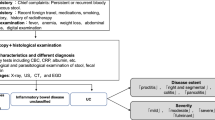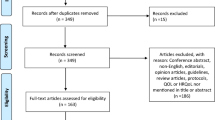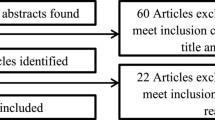Abstract
Background
Mobile applications and interactive websites are an increasingly used method of telemedicine, but their use lacks evidence in digestive diseases.
Aim
This study aims to explore digestive disease studies that use telemedicine to effectively manage disease activity, help monitor symptoms, improve compliance to the treatment protocol, increase patient satisfaction, and enhance the patient-to-provider communication.
Methods
EBSCO, PubMed, and Web of Science databases were searched using Medical Subject Headings and other keywords to identify studies that utilized telemedicine in patients with digestive disease. The PRISMA guidelines were used to identify 20 research articles that had data aligning with 4 common overlapping themes including, patient compliance (n = 13), patient satisfaction (n = 11), disease activity (n = 15), and quality of life (n = 13). The studies focused on digestive diseases including inflammatory bowel disease (n = 7), ulcerative colitis (n = 4), Crohn’s Disease (n = 1), irritable bowel syndrome (n = 6), and colorectal cancer (n = 2).
Results
From the studies included in this systematic review, patient compliance and patient satisfaction ranged between 25.7–100% and 74–100%, respectively. Disease activity, measured by symptom severity scales and physiological biomarkers, showed improvements following telemedicine interventions in several, but not all, studies. Similar to disease activity, general and disease-specific quality of life showed improvements following telemedicine interventions in as little as 12 weeks in some studies.
Conclusion
Telemedicine and mobile health technology may be effective in managing disease activity and improving quality of life in digestive diseases. Future studies should explore both gastrointestinal and gastroesophageal diseases using these types of interventions.


Similar content being viewed by others
References
Cross RK, Kane S. Integration of telemedicine into clinical gastroenterology and hepatology practice. Clin Gastroenterol Hepatol. 2017;15:175–181.
Meyers DJ, Ozonoff A, Baruwal A, et al. Combining healthcare-based and participatory approaches to surveillance: trends in diarrheal and respiratory conditions collected by a mobile phone system by community health workers in rural Nepal. PLOS ONE. 2016;11:1–13. https://doi.org/10.1371/journal.pone.0152738.
Cross RK, Arora M, Finkelstein J. Acceptance of telemanagement is high in patients with inflammatory bowel disease. J Clin Gastroenterol. 2006;40:200–208.
Larsen ME, Rowntree J, Young AM, et al. Chemotherapy side-effect management using mobile phones. Conference proceedings: annual international conference of the IEEE engineering in medicine and biology society. In: IEEE engineering in medicine and biology society. Annual conference. 2008;5152–5155. https://doi.org/10.1109/iembs.2008.4650374.
Van Deen WK, van der Meulen-de Jong AE, Parekh NK, et al. Development and validation of an inflammatory bowel diseases monitoring index for use with mobile health technologies. Clin Gastroenterol Hepatol. 2016;14:1742–1750.
Wu H, Chang C, Lin C, Tsai M, Chang C, Tseng M. Developing screening services for colorectal cancer on android smartphones. Telemed E-Health. 2014;20:687–695. https://doi.org/10.1089/tmj.2013.0288.
Pedersen N, Vegh Z, Burisch J, et al. Ehealth monitoring in irritable bowel syndrome patients treated with low fermentable oligo-, di-, mono-saccharides and polyols diet. World J Gastroenterol. 2014;20:6680–6684. https://doi.org/10.3748/wjg.v20.i21.6680.
de Jong M, van der Meulen-de J, Romberg-Camps M, et al. Development and feasibility study of a telemedicine tool for all patients with IBD: MyIBDcoach. Inflamm Bowel Dis. 2017. https://doi.org/10.1097/mib.0000000000001034.
Pedersen N, Elkjaer M, Duricova D, et al. eHealth: individualisation of infliximab treatment and disease course via a self-managed web-based solution in Crohn’s disease. Aliment Pharmacol Ther. 2012;36:840–849. https://doi.org/10.1111/apt.12043.
Chung C, Cook J, Bales E, Zia J, Munson SA. More than telemonitoring: health provider use and nonuse of life-log data in irritable bowel syndrome and weight management. J Med Internet Res. 2015. https://doi.org/10.2196/jmir.4364.
Cross RK, Finkelstein J. Feasibility and acceptance of a home telemanagement system in patients with inflammatory bowel disease: a 6-month pilot study. Dig Dis Sci. 2007;52:357–364. https://doi.org/10.1007/s10620-006-9523-4.
Pedersen N, Thielsen P, Martinsen L, et al. eHealth: individualization of mesalazine treatment through a self-managed web-based solution in mild-to-moderate ulcerative colitis. Inflamm Bowel Dis. 2014;20:2276–2285. https://doi.org/10.1097/MIB.0000000000000199.
Elkjaer M, Shuhaibar M, Burisch J, et al. E-health empowers patients with ulcerative colitis: a randomised controlled trial of the web-guided ‘constant-care’ approach. Gut. 2010;59:1652–1661. https://doi.org/10.1136/gut.2010.220160.
Moher D, Liberati A, Tetzlaff J, Altman DG. Preferred reporting items for systematic reviews and meta-analyses: the PRISMA statement. J Clin Epidemiol. 2009;62:1006–1012. https://doi.org/10.1016/j.jclinepi.2009.06.005.
Sawares AS, Shen N, Xue Y, Abi-Jaoude A, Wiljer D. The impact of mobile apps on alcohol use disorder: a systematic review protocol. JMIR Res Protoc. 2017;6:e49. https://doi.org/10.2196/resprot.6975.
Cross RK, Cheevers N, Finkelstein J. Home telemanagement for patients with ulcerative colitis (UC HAT). Dig Dis Sci. 2009;54:2463–2472. https://doi.org/10.1007/s10620-008-0640-0.
Cross RK, Cheevers N, Rustgi A, Langenberg P, Finkelstein J. Randomized, controlled trial of home telemanagement in patients with ulcerative colitis (UC HAT). Inflamm Bowel Dis. 2012;18:1018–1025. https://doi.org/10.1002/ibd.21795.
McCombie A, Gearry R, Andrews J, Mulder R, Mikocka-Walus A. Does computerized cognitive behavioral therapy help people with inflammatory bowel disease? A randomized controlled trial. Inflamm Bowel Dis J. 2016;22:171–181. https://doi.org/10.1097/MIB.0000000000000567.
de Jong MJ, van der Meulen-de Jong AE, Romberg-Camps MJ, et al. Telemedicine for management of inflammatory bowel disease (myIBDcoach): a pragmatic, multicenter, randomised controlled trial. Lancet. 2017;390:959–968. https://doi.org/10.1016/S0140-6736(17)31327-2.
Dorn SD, Palsson OS, Woldeghebriel M, et al. Development and pilot testing of an integrated, web-based self-management program for irritable bowel syndrome (IBS). Neurogastroenterol Motil. 2015;27:128–134. https://doi.org/10.1111/nmo.12487.
Everitt H, Moss-Morris R, Sibelli A, et al. Management of irritable bowel syndrome in primary care: the results of an exploratory randomised controlled trial of mebeverine, methylcellulose, placebo and a self-management website. BMC Gastroenterol. 2013;13:68. https://doi.org/10.1186/1471-230X-13-68. (Medline: 23602047).
Hunt MG, Moshier S, Milonova M. Brief cognitive-behavioral internet therapy for irritable bowel syndrome. Behav Res Ther. 2009;47:797–802. https://doi.org/10.1016/j.brat.2009.05.002. (Medline: 19570525).
Ljótsson B, Andersson G, Andersson E, et al. Acceptability, effectiveness, and cost-effectiveness of internet-based exposure treatment for irritable bowel syndrome in a clinical sample: a randomized controlled trial. BMC Gastroenterol. 2011;11:110. https://doi.org/10.1186/1471-230X-11-110. (Medline: 21992655).
Ljótsson B, Hedman E, Lindfors P, et al. Long-term follow-up of internet-delivered exposure and mindfulness based treatment for irritable bowel syndrome. Behav Res Ther. 2011;49:58–61. https://doi.org/10.1016/j.brat.2010.10.006. (Medline: 21092934).
Kearney N, McCann L, Norrie J, et al. Evaluation of a mobile phone-based, advanced symptom management system (ASyMS) in the management of chemotherapy-related toxicity. Supportive Care Cancer. 2009;17:437–444. https://doi.org/10.1007/s00520-008-0515-0.
Tonkin-Crine S, Bishop FL, Ellis M, Moss-Morris R, Everitt H. Exploring patients’ views of a cognitive behavioral therapy-based website for the self-management of irritable bowel syndrome symptoms. J Med Internet Res. 2013. https://doi.org/10.2196/jmir.2672.
Aguas M, Del Hoyo J, Faubel R, Nos P. Use of telemedicine in inflammatory bowel disease: a real monitoring option? Expert Rev Gastroenterol Hepatol. 2016;10:879–881. https://doi.org/10.1080/17474124.2016.1200464.
Hommel KA, Gray WN, Hente E, et al. The telehealth enhancement of adherence to medication (TEAM) in pediatric IBD trial: design and methodology. Contemp Clin Trials. 2015;43:105–113. https://doi.org/10.1016/j.cct.2015.05.013.
Cross RK, Jambaulikar G, Langenberg P, et al. TELEmedicine for patients with inflammatory bowel disease (TELE-IBD): design and implementation of randomized clinical trial. Contemp Clin Trials. 2015;42:132–144. https://doi.org/10.1016/j.cct.2015.03.006.
Castro HK, Cross RK, Finkelstein J. Using a home automated telemanagement (HAT) system: Experiences and perceptions of patients with inflammatory bowel disease. In: AMIA Annual Symposium Proceedings. 2006;872.
Cross RK, Finkelstein J. Challenges in the design of a home telemanagement trial for patients with ulcerative colitis. Clin Trials. 2009;6:649–657. https://doi.org/10.1177/1740774509346978.
Hommel KA, Hente E, Herzer M, Ingerski LM, Denson LA. Telehealth behavioral treatment for medication nonadherence: a pilot and feasibility study. Eur J Gastroenterol Hepatol. 2013;25:469–473. https://doi.org/10.1097/MEG.0b013e32835c2a1b.
Thomson M, Volk M, Kim H, Piette J, Kim HM, Piette JD. An automated telephone monitoring system to identify patients with cirrhosis at risk of re-hospitalization. Dig Dis Sci. 2015;60:3563–3569. https://doi.org/10.1007/s10620-015-3744-3.
Sharma S, Ward EC, Burns C, Theodoros D, Russell T. Assessing swallowing disorders online: a pilot telerehabilitation study. Telemed J E-Health. 2011;17:688–695. https://doi.org/10.1089/tmj.2011.0034.
Krier M, Kaltenbach T, McQuaid K, Soetikno R. Potential use of telemedicine to provide outpatient care for inflammatory bowel disease. Am J Gastroenterol. 2011;106:2063–2067. https://doi.org/10.1038/ajg.2011.329.
Heida A, Knol M, Kobold AM, Bootsman J, Dijkstra G, van Rheenen PF. Agreement between home-based measurement of stool calprotectin and ELISA results for monitoring inflammatory bowel disease activity. Clin Gastroenterol Hepatol. 2017. https://doi.org/10.1016/j.cgh.2017.06.007.
Acknowledgments
The author has not received payment or services from a third party for any aspect of the submitted work at any time. The authors’ employer has not received payment or services from a third party for any aspect of the submitted work at any time. There are no other relationships or activities that readers could perceive to have influenced, or that give the appearance of potentially influencing, what is written in the submitted work.
Author information
Authors and Affiliations
Corresponding author
Ethics declarations
Conflict of interest
The author has no conflicts of interest to report.
Rights and permissions
About this article
Cite this article
Helsel, B.C., Williams, J.E., Lawson, K. et al. Telemedicine and Mobile Health Technology Are Effective in the Management of Digestive Diseases: A Systematic Review. Dig Dis Sci 63, 1392–1408 (2018). https://doi.org/10.1007/s10620-018-5054-z
Received:
Accepted:
Published:
Issue Date:
DOI: https://doi.org/10.1007/s10620-018-5054-z




